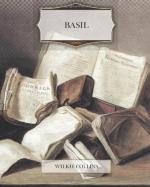The personal contrast between Mr. Sherwin and his clerk was remarkable enough, but the contrast between the dimensions and furnishing of the rooms they lived in, was to the full as extraordinary. The apartment I now surveyed was less than half the size of the sitting-room at North Villa. The paper on the walls was of a dark red; the curtains were of the same colour; the carpet was brown, and if it bore any pattern, that pattern was too quiet and unpretending to be visible by candlelight. One wall was entirely occupied by rows of dark mahogany shelves, completely filled with books, most of them cheap editions of the classical works of ancient and modern literature. The opposite wall was thickly hung with engravings in maple-wood frames from the works of modern painters, English and French. All the minor articles of furniture were of the plainest and neatest order—even the white china tea-pot and tea-cup on the table, had neither pattern nor colouring of any kind. What a contrast was this room to the drawing-room at North Villa!
On his return, Mr. Mannion found me looking at his tea-equipage. “I am afraid, Sir, I must confess myself an epicure and a prodigal in two things,” he said; “an epicure in tea, and a prodigal (at least for a person in my situation) in books. However, I receive a liberal salary, and can satisfy my tastes, such as they are, and save money too. What can I offer you, Sir?”
Seeing the preparations on the table, I asked for tea. While he was speaking to me, there was one peculiarity about him that I observed. Almost all men, when they stand on their own hearths, in their own homes, instinctively alter more or less from their out-of-door manner: the stiffest people expand, the coldest thaw a little, by their own firesides. It was not so with Mr. Mannion. He was exactly the same man at his own house that he was at Mr. Sherwin’s.
There was no need for him to have told me that he was an epicure in tea; the manner in which he made it would have betrayed that to anybody. He put in nearly treble the quantity which would generally be considered sufficient for two persons; and almost immediately after he had filled the tea-pot with boiling water, began to pour from it into the cups—thus preserving all the aroma and delicacy of flavour in the herb, without the alloy of any of the coarser part of its strength. When we had finished our first cups, there was no pouring of dregs into a basin, or of fresh water on the leaves. A middle-aged female servant, neat and quiet, came up and took away the tray, bringing it to us again with the tea-pot and tea-cups clean and empty, to receive a fresh infusion from fresh leaves. These were trifles to notice; but I thought of other tradesmen’s clerks who were drinking their gin-and-water jovially, at home or at a tavern, and found Mr. Mannion a more exasperating mystery to me than ever.




